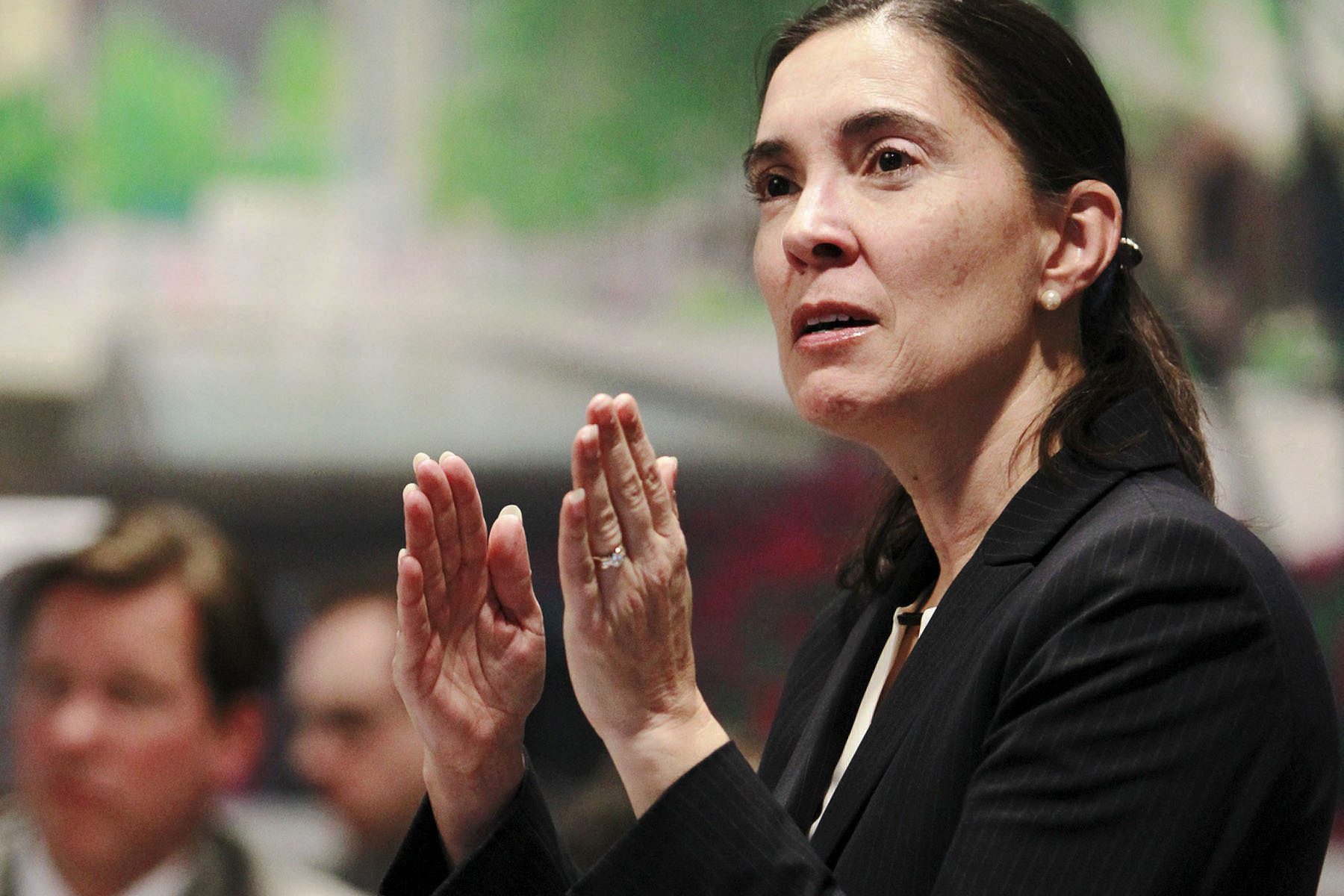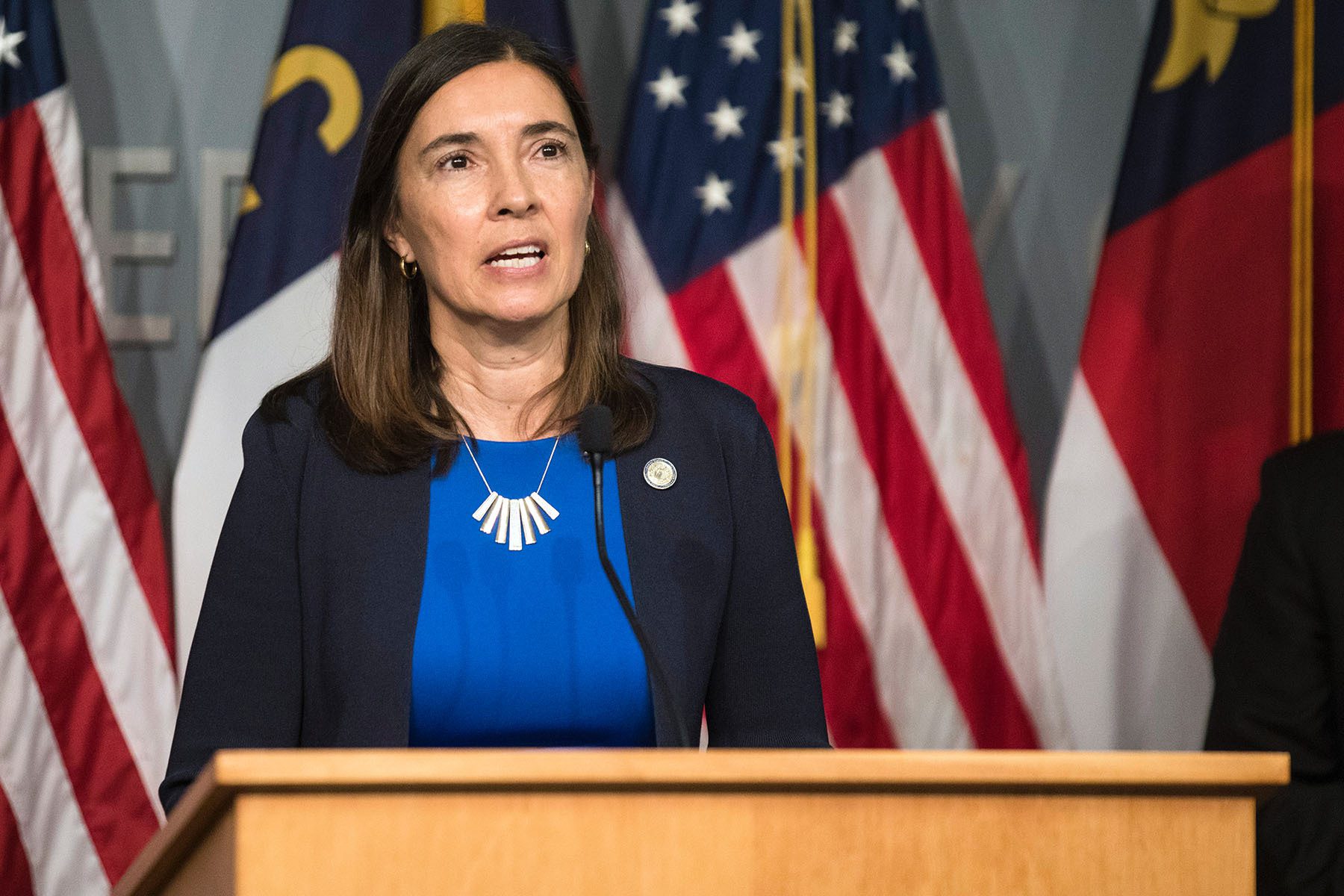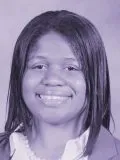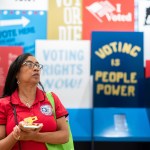We’re answering the “how” and “why” of politics news. Subscribe to our daily newsletter.
RALEIGH, N.C. — Anita Earls, the sole Black woman currently serving on the North Carolina Supreme Court, doesn’t mind dissenting — even when she’s alone.
She has seen, in her personal and professional life, that the law isn’t always just. When she came into this world, it was illegal in many states for an interracial couple, like her parents, to be married. They could adopt Earls and her brother solely because at that time, only interracial couples were legally allowed to adopt biracial children. She grew up shaped by this knowledge, amid the civil rights movement, and later worked in civil rights law, playing a pivotal role in dismantling a North Carolina voter ID law that a court would rule had targeted Black Americans with “almost surgical precision.”
The court is set this week to begin reconsidering two consequential voting rights cases, and right now, the most powerful tool Earls has to continue to work for those most denied power may be her dissents.
“What’s important to me is to remain grounded in the communities that I come from and the communities that I think of as most denied justice in our society in so many ways,” Earls told The 19th. “To remain grounded in that no matter how many times I have to write decisions that I’m the lone dissenter — no matter how many of those there are — that I don’t back down from what I believe in.”
She is one of only three Black women and seven Black people who have served on the North Carolina Supreme Court in its 205-year history. Earls — who was reportedly on a short list of potential Supreme Court candidates last year — went from being part of a 4-3 liberal majority to one of just two Democrats on the court after the November election. It’s a shift that may have major consequences for how democracy works in the state.
-
More from The 19th
- ‘I can’t wait anymore’: This 25-year-old organizer is betting on young and rural voters to flip North Carolina blue
- A proposed six-week abortion ban in Florida could threaten access for the entire South
- South Carolina is the only state without a woman on its supreme court. Here’s why that matters.
Starting Tuesday, the North Carolina Supreme Court is rehearing two critical voting rights cases that it decided just three months ago, when the court had a Democratic majority. One, Holmes v. Moore, is a case over a voter ID law that the court struck down, calling it racially discriminatory, and the other is Harper v. Hall, in which the court invalidated a congressional map, calling it an extreme partisan gerrymander.
The now-majority-Republican court granted a petition last month to rehear the cases, citing a procedural rule that allows rehearings if the court overlooks or misinterprets a fact. Attorneys for Republican state lawmakers had contended that the original decisions were erroneous. Questions around redistricting are outside of the purview of the court and should instead be left up to the legislature, the lawyers argued in Harper v. Hall. In regards to the voter ID law, they claimed that it could not be racist because a Black legislator had voted for it.
A court reviewing its own decisions, particularly so quickly, is rare. Earls was in the majority in the original ruling in both those cases, but she, along with Michael Morgan, the only other Democrat and Black justice on the court, disagreed with the rehearing. In Earls’ scathing dissent, she referred to the decisions to rehear the cases as a “power grab.” She noted that since 1993, over 200 petitions for rehearing had been filed, but rehearing had been allowed in only two.
“Not only does today’s display of raw partisanship call into question the impartiality of the courts, but it erodes the notion that the judicial branch has the institutional capacity to be a principled check on legislation that violates constitutional and human rights,” she wrote.
For Earls, the court’s role in how democracy works is fundamental.
Born in 1960, Earls entered the world at a time when activists were working toward a new democracy, one in which Black women would have access to their full citizenship rights, just like other Americans. The push for equality shaped her career; out of law school, she practiced civil rights litigation at North Carolina’s first integrated law firm. She was later appointed by President Bill Clinton to serve as deputy assistant attorney general in the Civil Rights Division of the U.S. Department of Justice and then served as director of the voting project at the Lawyers’ Committee for Civil Rights.
In 2007, she founded the Southern Coalition for Social Justice (SCSJ), a group that works to advance the rights of people of color and economically disadvantaged groups. In that role, as in her previous jobs, Earls was intentional about wanting to be close to those she was representing. For her, the most important quality for a lawyer is the ability to listen.
“Even if you can identify with your client across many levels, you still need to listen to what their individual experience is. The last thing you should be doing is assuming that you know or that you understand,” Earls said.
These qualities left an impression on Allison Riggs, who was recently appointed by Gov. Roy Cooper to the North Carolina Court of Appeals. Riggs began working at the SCSJ in its early days, when she was fresh out of law school.

Earls mentored and listened to younger attorneys, Riggs said. Riggs gained experience because Earls supported her in arguing important cases, rather than guarding those opportunities for herself.
“I think her career is as remarkable as it has been because she’s created her own opportunity and more importantly, she’s been speaking up for the people in the community that a lot of lawyers have never prioritized or haven’t prioritized until it’s come up as a U.S. Supreme Court case,” Riggs said.
Last month when Riggs was formally invested as a Judge on the North Carolina Court of Appeals, it was Earls who conducted the ceremony.
“I want to emphasize the power and value of women’s leadership across the board. I’ve seen that throughout my career. Any way that I can encourage, whether it’s young lawyers or young women in other areas, I certainly want to do that,” Earls told The 19th.
Riggs noted that at SCSJ, Earls would primarily write briefs herself when she was set to argue a case.
“That’s unusual. Normally someone with that level of seniority will have someone else do the grunt work and then come in and deliver the argument, but she holds herself to the highest levels of preparation,” Riggs said.
Earls is now in her first eight-year term on the state Supreme Court, which she secured in 2018.
Gene Nichol, who leads the N.C. Poverty Research Fund at the UNC School of Law, praised Earls. He sees her background as key to the court as it considers cases on how democracy functions in the state.
“She may be the most deeply accomplished voting rights justice anywhere in the United States, federal or state,” Nichol said. “We need her expertise very badly at this time.”
Nichol has long been critical of the North Carolina General Assembly’s Republican leadership over legislation that he says directly preys on the poor. For this reason, he argues, oversight from the court is critical. “No legislature in the United States has proven itself more needful of the effective constraint of independent judicial review than the NC General Assembly,” Nichol wrote in a recent opinion piece.
But, Nichol believes, the North Carolina Supreme Court is on track to shirk its duty to review legislation and become the most partisan court in state history.
“I fear the present North Carolina Supreme Court is going to fail in that mission of independent judicial review just miserably and they’re going to do so intentionally,” Nichol said in an interview with The 19th.
Earls, in her dissent to the decision to reopen the cases, argued that the Republican majority was undermining trust in the court. Her language was straightforward; she wrote, she said, to “make clear that the emperor has no clothes.”
“The way she laid out why this was such an extreme power grab, I don’t think any other judge could have done that effectively, to be honest,” said Billy Corriher, a longtime advocate for progressive judges and courts.
Corriher said the two cases the court is rehearing could have major impacts on the state’s elections, which can be decided by a small margin. He pointed to the 2020 election, when Cheri Beasley, the first Black woman to be chief justice of the state Supreme Court, lost by 401 votes.
“We’ve seen in North Carolina, we’re a very closely divided state and every vote counts,” Corriher said.
Earls doesn’t think all the work for equality can be done in a courtroom.
“Progress toward liberation of people of color and women has happened because of activities and resistance in many other arenas, not necessarily the halls of the legislature or court,” she said. But she does believe in the power of having justices, legislators and others in positions of power who are willing to work to create a democratic system for everyone.
In her chambers at the court, on a bookshelf sit portraits of two Black Americans: Fannie Lou Hamer and Pauli Murray. Hamer was a Mississippi sharecropper and voting rights activist who told the country about the violence she endured for simply trying to register to vote. Murray was a pioneering legal scholar who ultimately crafted the legal argument that Thurgood Marshall would use to successfully argue the Brown v. Board of Education case that established that state laws mandating racial segregation in public schools are unconstitutional.
Many civil rights advocates are planning to gather in Raleigh on Tuesday, standing outside the court to protest the rehearings as Earls and the other justices hear arguments in the cases.
“What I can accomplish is entirely dependent on the voices of poor people, people of color, of women being lifted up. That’s just very clear,” Earls said.






